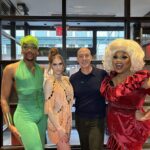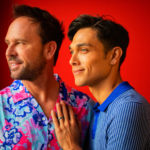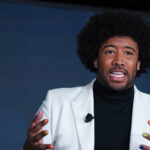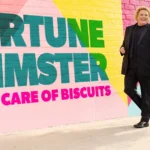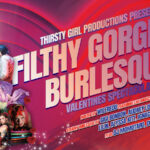As someone with theatrical aspirations of my own once upon a time, I’ve always been fascinated by what it takes to make it to Broadway, the Holy Grail for most actors. Exceptional talent of course is a baseline requirement as well as a dogged determination and belief in oneself that’s undeterred by the odds. Henry Gottfried, no relation to me that I know of, might not yet have the name recognition of someone like Aaron Tveit or Sutton Foster, but with credits in Waitress, Pippin and now occupying coveted real estate at the August Wilson Theatre in the starry revival of Cabaret at the Kit Kat Club, he’s certainly beaten the odds and earned his stripes. It took a bit of convincing, which tells you a lot about the alchemy of humility, tenacity and respect for the craft that makes Henry so appealing.
Henry grew up in Nashville, the third son of two academics who transferred from their native New England to work at Vanderbilt University. The theatre bug bit henry early on. He also realized early on that he wasn’t like the other little boys. He knew he was gay and lucky for him; he grew up in a nurturing environment and was able to feel comfortable enough in his own skin to come out with little fanfare midway through high school. Buoyed by his dreams and talent, he went on to the prestigious Yale School of Drama (Meryl Streep’s alma mater) where he became a member of the Whiffenpoofs which holds the distinction of being the oldest collegiate a capella group in the country and counts among its alumni the renowned composer-lyricist Cole Porter. While the path to Broadway might seem preordained from a distance, Henry Gottfried will be the first to acknowledge it’s a much more complicated journey, closer to Dorothy’s road to Oz with challenges and obstacles along the way.
Henry is currently starring in the much talked about Broadway revival of Cabaret, taking on the role of Ernst Ludwig, the charming German businessman who befriends American writer Cliff Bradshaw and is eventually revealed to be a member of the Nazi party. When asked about his character, it’s clear that Henry approaches the character in a very thoughtful and deliberate manner, all within the framework of the director’s vision. I couldn’t help wondering how it would feel to play a character with such a sinister allegiance, particularly for someone like Henry who is not only gay but has Jewish heritage on his father’s side.
I don’t focus a light on it too specifically. I don’t know if it would be helpful for the work or for my process. But I do think that on an intellectual level, it’s interesting and potentially important that I play this role with Jewish heritage and as a queer person, both of which are plausible pieces of Ernst’s identity. In this production, Ernst is openly sexual across the board so it’s not in conflict with his politics.
Does that queerness manifest in Ernst’s relationship with Cliff?
Yes. It does in this production. In the way that I like to play it, it is overt. It’s flirtatiously suggestive but not in a very hidden way. Ernst behaves in a way that’s boldly looking to elicit a response from Cliff who is more visibly, more palpably queer.
In our production, Ernst is [genuinely] seeking to foster a closeness with Cliff. And he’s offering that flirtation as one of the ways they might bond and be close. But I don’t think it’s manipulative in that he has an über agenda or that this is a very calculated step towards that overarching goal. I like that I get to play Ernst as someone who believes himself to be well-meaning. He is using Cliff, but I don’t know if he even recognizes the extent to which he’s using Cliff. No one thinks that their politics are patently evil. You have to believe in the cause, whatever the cause is. And in Ernst’s case, he believes in the cause and he’s not thinking too critically about the ramifications.
It’s such a powerful piece in terms of what’s going on both here and around the world.
It’s part of what makes Cabaret so universally affecting. We were visited by John Kander, the show’s composer, and heard him say that it’s both amazing and harrowing that at every point in history between when the show was written in the ‘60s and now, that it has seemed to speak to the moment. But the crucial message of Cabaret is beware fascism in whatever form, wherever it is taking root.
Do you consider yourself fairly politically engaged?
I try to be. I try to surround myself with people who encourage me to be.
Have you ever played a villain before? Or is this kind of a new thing for you? To play someone who’s got kind of a dark side. Not that you necessarily define Ernst as a villain per se. You strike me as someone who could have played Cliff Bradshaw, the wide-eyed innocent.
One of the things that’s very fresh about this production is that in many incarnations of Cabaret, Cliff has looked like someone like me and Ernst has not necessarily. And that’s this director Rebecca Frecknall’s vision for the piece, that Ernst would be young and (if I’m allowed to say it) good-looking and that’s part of what makes him appealing and not seem sinister from the jump. This production has always cast Cliff as a person of color which is also an important piece of the dynamic of how this telling of Cabaret works. As far as playing a villain before, I think I must have. I feel like I have a face for a villain somehow. I played Pirelli in a production of Sweeney Todd in college. He’s sort of a villain. He was trying to blackmail Sweeney.
A comedic villain.
Right, that’s my sweet spot. Comedic villain.
And do you miss not singing in this production? Because that’s also your sweet spot.
There are some days where I miss not singing. I only get to sing a little – I sing about eight bars [the Nazi-inspired anthem “Tomorrow Belongs to Me”] with another character. But I will also say, it’s such a relief to have a job where my day doesn’t revolve around making sure that I am vocally up to the performance that night. I’ve had some jobs like that and it’s a low-grade anxiety way to live.
What was your first big break?
 My first big job was as an understudy for Peter Pan Live on NBC. They were doing those live TV musical broadcasts. I was hired as a Swing, which requires being ready to fill in at a moment’s notice in case of illness or injury. I covered all ten of the Lost Boys and then additionally, all of the Pirates as well. I rehearsed and learned every one of these tracks that I covered and had my own costumes and wigs and was ready to cover all these people. It was a great job, and I couldn’t believe my luck at getting to work at that level with some of Broadway’s best. I wasn’t in the actual broadcast, but it was great training to have to learn a million things at once. It was like a year of grad school for how the industry works, how to rehearse a Broadway show, and how to be a part of the community.
My first big job was as an understudy for Peter Pan Live on NBC. They were doing those live TV musical broadcasts. I was hired as a Swing, which requires being ready to fill in at a moment’s notice in case of illness or injury. I covered all ten of the Lost Boys and then additionally, all of the Pirates as well. I rehearsed and learned every one of these tracks that I covered and had my own costumes and wigs and was ready to cover all these people. It was a great job, and I couldn’t believe my luck at getting to work at that level with some of Broadway’s best. I wasn’t in the actual broadcast, but it was great training to have to learn a million things at once. It was like a year of grad school for how the industry works, how to rehearse a Broadway show, and how to be a part of the community.
I was lucky to have a couple of great opportunities very quickly after college which was wonderful. But my lean years just came later. And in a way, it then felt like I hadn’t gained the sea legs for knowing how to make it through a long stretch of not working, how to pay my rent, how to stay afloat mentally and otherwise because I hadn’t built up the constitution for how to do that in my first few years out of college. I think that’s just the reality of wanting to make a life in the arts and having to be okay with weathering that
Where did Waitress come in?
I went out on tour with Pippin (the revival) and after coming back to the city, had my first audition, which ended up being a pretty long audition process for Waitress. I didn’t get the job. And then a few months later, they needed a Swing, and they asked me to come in one more time. I was hired as a Swing to cover those ensemble tracks and those principal roles. I did eventually get to play the role of Dr. Pomatter briefly, which was the romantic lead that I understudied. Because I had gone on so often, the creative team knew that I could be trusted to do the part when they needed somebody to fill in.
Do you feel like you kind of work your way up, in a show like that? They see you fill in for someone and you kind of get your “Ruby Keeler” moment?
I wish I could say it worked that way. But it doesn’t really. In part because Swings are so valuable to a show. They hold so much more knowledge than someone who only has one track to worry about. You become invaluable as an asset and the company is usually pretty reluctant to move you elsewhere and have to train someone new. It’d be nice if anything in an artistic life worked linearly, but if you get a wide enough view, I suppose there is a sort of trajectory to it. But, it is just a series of lucky breaks over and over again.
How early did you know this was the field you wanted to be in?
Almost as far back as I can remember there was one thing that I cared about, and it was theatre. It was seeing theatre, every play and musical that came through town, getting every book out of the library about theatre, stagecraft, and design, listening to every cast album I could get my hands on. Total nerdy theatre kid.
Showmances: good idea, bad idea?
I think they’re a bad idea. In any profession, people warn against romances in the workplace, don’t they? And I think what’s tricky about working in theatre is that it’s close quarters and odd hours, and you’re surrounded by charming, interesting, artistic people, people for who being charming is their professional responsibility. It’s good to avoid it, and I have mostly done well.
Mostly?
Yeah. Not since I was really young and didn’t know better. I’ve been single for a handful of years and dating. And there’s several different ways in which it’s hard – especially working in theatre. Working as an artist, as a free-lancer, with such inconsistency in your life and financial insecurity, and your schedule is erratic – it can be hard to find someone who understands that who’s not also an artist. Or who appreciates all that with all of its downsides. Then, working in the theatre at such odd hours, it can be hard just from a logistical standpoint. It can be hard to find time with someone who’s just working conventional 9 to 5 hours. I go to work at 6:30pm most days. So that’s why I think people in theatre, over and over again, end up dating people in theatre.
Adam Lambert is going to be joining the cast, replacing Eddie Redmayne as the Emcee. So that’s three openly gay actors including yourself and the actor who’s currently playing Cliff.
And many more. You know, what I think is really exciting about Adam Lambert joining the cast, is that he’s such a different kind of performer from Eddie, who is incredible. And I can’t say enough great things about him as an actor. But it’s like apples and oranges. What they do is so different. I think Cabaret (the show) and this production specifically are elastic enough that there can be some really different interpretations. And I think it’s really smart that they have someone coming in after Eddie who you would never try and compare the two as performers. So yeah, it’s going to be hard to let go of this version of the show that I’m really attached to. But I’m as excited about this new chapter as I am sad to say goodbye.
Looking back, what was your coming out process?
I was so lucky, and I knew it at the time. I went to this wonderful K through 12 school that was a really nurturing, beautiful, artistic, happy environment. I loved school and I felt very seen and very celebrated at school, before coming out and after coming out. So, I never worried about it in my school context. I never worried about what my parents would say. There were some gay kids ahead of me in the high school who had already come out, who showed me that it would be fine and that everyone in the school would love me. I came out mid-high school. But I was a very gay kid, so it wouldn’t have been easy to hide it for very long.
Do you have any “dream roles” you’d like to play? Or are there any gay roles that you’d like to play. Since there have been some high-profile gay plays like The Inheritance. Do you have any longing to sink your teeth into a role like that? Or are you interested in whatever comes your way, acting-wise?
I am open. I don’t know that I ever would have pinpointed Ernst as a role I wanted to take a crack at. But as soon as the audition came up, I looked at it and thought, I think I know what I would want to do with that. One of the things that is so cool to me about this production of Cabaret is that it very palpably brings a queer aesthetic and some queer lenses to this story. There’s always been some queerness in Cabaret, but I think there’s even more of a contemporary queer examination of this show.
In our revival, the Kit Kat Club is very much a space of fluidity, openness, and gender expansiveness… and this is a big clue as to who Ernst is… that he’s a frequent visitor of that kind of club. The tide of fascism saps the life and the color out of this place and its people until all that’s left is drab conformity.
Cabaret at the Kit Kat Club
in the August Wilson Theatre
245 West 52nd Street
Between Broadway Avenue & 8th Avenue
Last modified: October 30, 2024





